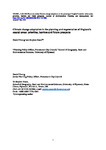Climate change adaptation in the planning of England’s coastal urban areas: priorities, barriers and future prospects
| dc.contributor.author | Young, D | en |
| dc.contributor.author | Essex, S | en |
| dc.date.accessioned | 2019-06-25T14:04:23Z | |
| dc.date.available | 2019-06-25T14:04:23Z | |
| dc.identifier.issn | 0964-0568 | en |
| dc.identifier.uri | http://hdl.handle.net/10026.1/14438 | |
| dc.description.abstract |
Climate change is one of the greatest challenges facing society and the spatial planning system plays a crucial role in ensuring that important adaptations to the built environment are evaluated. Drawing upon a mixed-methods research approach, this paper explores the progress that has been made by the planning system in England in addressing the challenge of climate change adaptation in coastal urban areas. The results indicate that the adaptation produced through the planning system remains incremental rather than transformative. It is focused on experienced hazards, especially flooding, and there is a lack of attention being paid to wider impacts of climate change, such as rising average temperatures. Furthermore, it was found that the contemporary contribution of planning to climate change adaptation is seriously limited by the government’s emphasis on housing and economic growth and by the development industry’s emphasis on economic viability. | |
| dc.format.extent | 1 - 23 | en |
| dc.language | en | en |
| dc.language.iso | en | en |
| dc.publisher | Informa UK Limited | en |
| dc.rights | Attribution-NonCommercial-NoDerivatives 4.0 International | en |
| dc.rights.uri | http://creativecommons.org/licenses/by-nc-nd/4.0/ | en |
| dc.title | Climate change adaptation in the planning of England’s coastal urban areas: priorities, barriers and future prospects | en |
| dc.type | Journal Article | |
| plymouth.publication-status | Published online | en |
| plymouth.journal | Journal of Environmental Planning and Management | en |
| dc.identifier.doi | 10.1080/09640568.2019.1617680 | en |
| plymouth.organisational-group | /Plymouth | |
| plymouth.organisational-group | /Plymouth/00 Groups by role | |
| plymouth.organisational-group | /Plymouth/00 Groups by role/Academics | |
| plymouth.organisational-group | /Plymouth/Faculty of Science and Engineering | |
| plymouth.organisational-group | /Plymouth/Faculty of Science and Engineering/School of Geography, Earth and Environmental Sciences | |
| plymouth.organisational-group | /Plymouth/REF 2021 Researchers by UoA | |
| plymouth.organisational-group | /Plymouth/REF 2021 Researchers by UoA/UoA14 Geography and Environmental Studies | |
| plymouth.organisational-group | /Plymouth/Research Groups | |
| plymouth.organisational-group | /Plymouth/Research Groups/Centre for Research in Environment and Society (CeRES) | |
| plymouth.organisational-group | /Plymouth/Research Groups/Centre for Research in Environment and Society (CeRES)/CeRES (Reporting) | |
| plymouth.organisational-group | /Plymouth/Research Groups/Marine Institute | |
| plymouth.declined | 2019-06-25T15:04:23.456+0100 | |
| dc.identifier.eissn | 1360-0559 | en |
| dc.rights.embargoperiod | Not known | en |
| rioxxterms.versionofrecord | 10.1080/09640568.2019.1617680 | en |
| rioxxterms.licenseref.uri | http://creativecommons.org/licenses/by-nc-nd/4.0/ | en |
| rioxxterms.type | Journal Article/Review | en |



